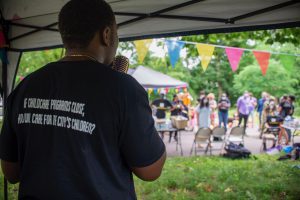#NoChildcareNoWork is one of the latest hashtags born from the COVID-19 global pandemic and the impact on parents, children and the entire child care industry. I had the pleasure of speaking with Andre Farrell, Founder and Executive Director of The Katmint Initiative which participated and hosted a #NoChildcareNoWork protest and picnic on Saturday June 27, 2020, in Lincoln Terrace Park, Brooklyn, New York.
As the mother of four children who have all attended early child care programs, I wondered what work would and could be possible if there were no child care providers. The answer for me was simple, had I not had access to early childcare for my children I would have not been able to work, period.
#NoChildcareNoWork is as simple as it gets. “And that’s the exact dilemma our parents found themselves in on the evening of March 16, 2020. And we are still not open to service our families now due to government red tape that separates our child care programs from those that are homebased that were not forced to close,” he said. Which prompted more questions:
Why are you organizing in NY for child care?
Andre Farrell: I am organizing because the industry neighborhoods in our nation are on the verge of collapse and it seems as if elected officials see child care as not essential.
Why is child care an important issue for people?
Andre Farrell: There are many reasons why child care is important. First, child care provides fundamental first steps for children ages 0-5, which are the most important years in an adolescent’s life. Studies have shown that based on their early learning will dictate their future outcomes and how children see the world. Therefore, without child care this could negatively affect their development and growth.
Second, and it cannot be overlooked, without child care the country cannot return to a life of any normalcy #NoChildcareNoWork
What are you trying to get done?
Andre Farrell: We are asking for Federal and State legislatures to provide the investment urgently needed for child care and early childhood education. To be more direct, the child care industry needs at least $50 billion to ensure child care centers can sustain themselves through the pandemic and allow families financial coverage of the child care cost while they recover from their loss of income.
We are also asking for reopening guidance from the New York City Department of Health and Mental Hygiene (DOHMH). This guidance is vital. With state run programs by the Office of Children and Family Services being allowed to remain open, summer camps by DOHMH also being allowed to operate, and children’s capacities being increased to the same number of students for home-base programs that would be in one class at a center base, plans to reopen are needed immediately so we can serve families who need it the most, safely.

Across New York and the country, child care programs are facing risk of permanent closure due to the coronavirus pandemic. Child care workers, already paid low wages, have found themselves struggling to make ends meet and missing the children and families they love and care for every day.
“After today’s event I know change is on the horizon. Our voice is becoming louder and our coalition will continue to ensure early childhood education and child care is no longer invisible,” stated Farrell.
As parents in America, we know this too well: Our country can do more to ensure access to high quality child care, support the child care and early learning workforce, and advance equity.